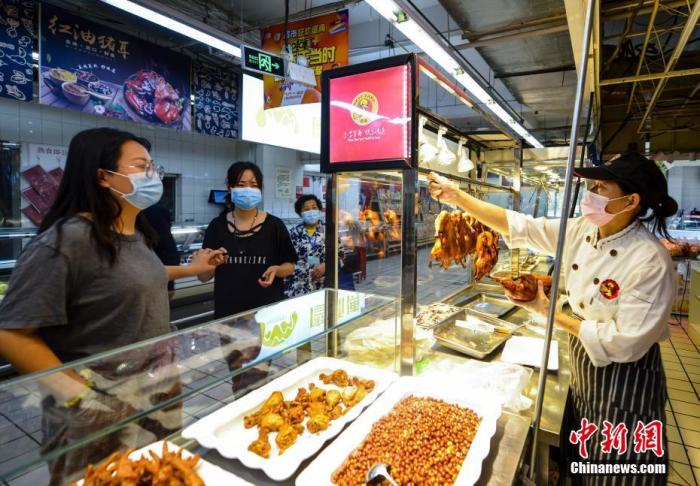China News Service, January 5th. According to the website of the Ministry of Commerce, the General Office of the Ministry of Commerce recently issued four prevention and control guidelines including the "Technical Guidelines for Epidemic Prevention and Control in Shopping Malls and Supermarkets", suggesting that customers who do not wear masks should be denied entry to shopping malls, Supermarket.
Data map: Citizens buy goods in supermarkets.
Photo by China News Agency reporter Liu Xin
The "Technical Guidelines for Epidemic Prevention and Control in Shopping Malls and Supermarkets" mentioned that for groups such as the elderly who do not use or do not operate smartphones, their health codes can be registered with valid ID cards, handled by relatives and friends, and show "communication itinerary cards", etc. Alternative measures, do a good job of manual service guidance.
Workers should wear masks and gloves when handing over items to avoid direct contact.
When customers do not wear masks, they should be refused entry into shopping malls and supermarkets.
Wear a mask all the time when taking the elevator.
Encourage to post the inspection and quarantine certificate, customs clearance certificate, disinfection certificate, nucleic acid test report and traceability code of imported cold chain food in the sales area, so that customers can consume with confidence.
The "Technical Guidelines for the Prevention and Control of Epidemics in the Agricultural Trade (Market Trade) Market" pointed out that the poultry meat area, aquatic product area, and cooked food area should have taps, sinks, drains and sewers, and the ground should be flat and fully hardened.
The distribution of live poultry shall have fixed metal cages and water flushing facilities.
The live fish trading is separated from the slaughter, and the aquatic product trading area is separated from the segmented processing area, all of which are physically separated.
After each batch of slaughter, the site should be washed once to keep it clean and tidy, and the garbage generated should be disposed of in time.
There is no dirt accumulation or residue in the pool, and the faucet is kept clean.
Workers should wear masks and gloves when handing over items, and should keep a safe distance when communicating with customer service and avoid direct contact.
Customers should wear masks, and gloves are recommended when choosing products.
When customers do not wear masks, they are refused entry into the market for shopping.
The "Technical Guidelines for Normalized Prevention and Control of the New Coronary Pneumonia Epidemic of Catering Service Units" clarified that catering service units operating in high- and medium-risk areas should record information such as going out.
Strengthen the management of dormitories, and do a good job in protection, cleaning and disinfection.
Practitioners who directly operate cold chain food and other high-risk risks should promptly carry out new coronary pneumonia vaccination and strengthen key protections.
For frequently touched public goods and facilities (such as elevator buttons, escalator handrails, etc.), clean and disinfect no less than three times a day.
Ensure that the toilet is well ventilated, the hand washing equipment is operating normally, and the wash basin, floor drain and other water seals are effectively isolated.
Clean and disinfect at least three times a day, and disinfect door handles, faucets, and switches at least once every two hours.
Strengthen garbage classification management, timely collection and removal.
Special trash bins should be set up for discarded masks.
Clean and disinfect the garbage storage facilities every day.
Pay close attention to the changes in the epidemic situation in the location of the raw material supplier. If the raw material supplier has an employee diagnosed, the purchased raw material will be sealed for inspection in accordance with relevant prevention and control regulations.
For customers with meals, the catering service unit should provide “one dish, one serving chopsticks, one soup and one serving spoon", or “one serving one serving chopsticks, one serving one serving spoon” service. The serving spoons and public chopsticks should adopt different colors, materials or prominent signs. And other eye-catching ways to distinguish.
Encourage the provision of sealed toothpicks.
Conditional restaurants (parks) should actively promote the meal sharing system.
It is recommended that the meal time should not exceed two hours.
The "Technical Guidelines for the Normalization of the Prevention and Control of the New Coronary Pneumonia Epidemic in Exhibition Activities" stated that no exhibition activities will be held in the medium- and high-risk areas.
Under the premise of strictly implementing various prevention and control measures, necessary exhibition activities can be held in low-risk areas.
During the winter and spring season, New Year's Day, Spring Festival and other key holidays, exhibition activities should be held cautiously, and online exhibition activities should be encouraged and supported.
In principle, foreigners are not invited to participate in the exhibition, and overseas exhibitors and visitors are encouraged to participate in the exhibition online, or entrust their branches, representative offices or partners in China to participate in offline exhibition activities.

